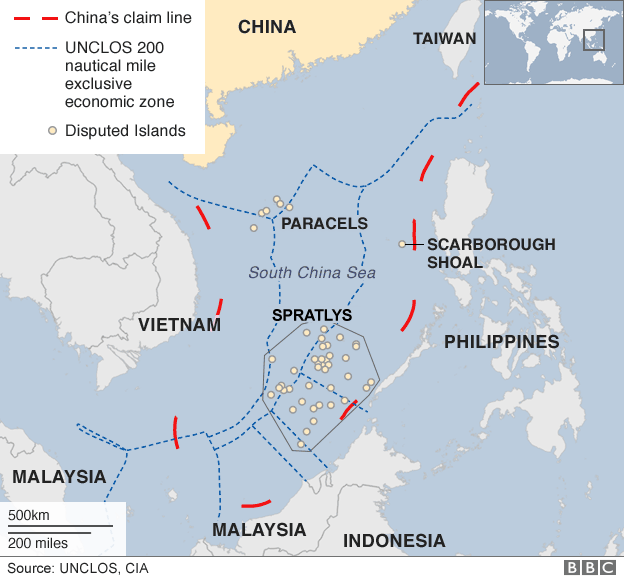South China Sea: Blackpink Vietnam concert in trouble over China map
- Published

Blackpink's concert organisers in Vietnam has apologised for their website displaying a map that Beijing uses to justify its vast claims in the South China Sea.
The Korean pop sensations are due to perform two concerts there this month.
Vietnam's foreign ministry spokesman called the map on promoter iME's website a "hot button issue", adding that it was "unacceptable".
The Beijing-headquartered company said it would replace the images.
Eagle-eyed internet users in Vietnam spotted the map on the website.
Vietnam is among a number of countries that contest China's claim to almost all of the South China Sea.
The nine-dash line is used in Chinese maps of the South China Sea to show its territorial claims.

Vietnam's Ministry of Foreign Affairs spokesperson Pham Thu Hang said that the "promotion and usage of products or publications featuring the 'nine-dash line' in Vietnam is a violation of Vietnam's laws and is unacceptable".
Vietnam's culture ministry said it was investigating the incident.
In its apology, iME said the map on its website "does not represent the territory of any country and we are aware of respecting the sovereignty and culture of all the countries".
The company's CEO, Brian Chow called the incident an "unfortunate misunderstanding".
Live performances by big name pop acts like Blackpink are rare in Vietnam.
The controversy with Blackpink comes days after Vietnam banned the Barbie movie over its portrayal of the nine-dash map.
The film's distributor, Warner Bros, has defended its depiction of the map, saying it was a "whimsical, child-like crayon drawing".
"The doodles depict Barbie's make-believe journey from Barbie Land to the real world. It was not intended to make any type of statement," the studio said.
In 2016 an international tribunal in The Hague ruled against Chinese claims in the South China Sea, but Beijing did not recognise the judgement.
Instead it has built artificial islands over previously uninhabited reefs and outcrops.
- Published14 July 2020

- Published14 July 2020

- Published28 April 2023
